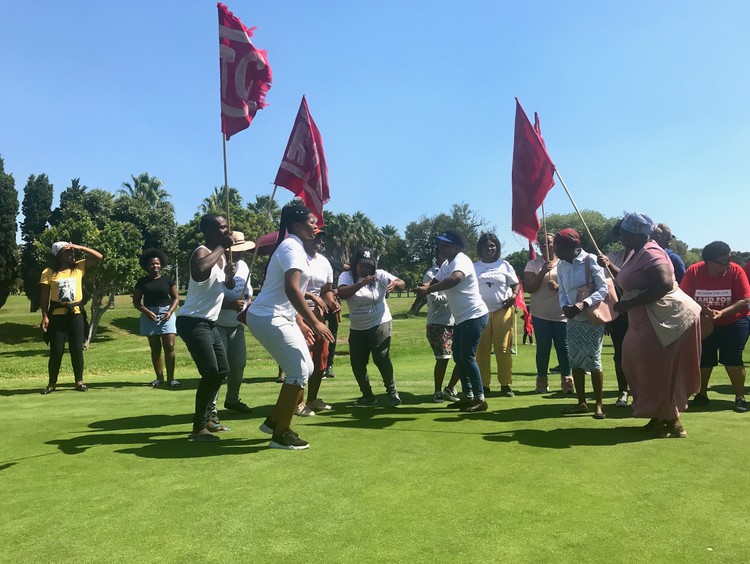Housing activists welcome City’s intention to develop Mowbray golf course
For years Reclaim the City and Ndifuna Ukwazi have been calling for leased golf courses to rather be used for social housing
Housing activists protested in February 2020 at the Rondebosch Golf Club calling on the City of Cape Town to prioritise building affordable housing for working class people. Archive photo: Tariro Washinyira
Housing activists have cautiously welcomed the City of Cape Town’s announcement that portions of the Mowbray Golf Course may be released for mixed-use development, including affordable housing.
On Tuesday, the City said a public participation process will commence, pending council approval this month.
This follows the expiration of the King David Mowbray Golf Club’s long-term lease in 2022, and a new ten-year lease signed in May 2024.
The current lease includes a two-year cancellation clause, “providing flexibility as the City undertakes the necessary planning for municipal infrastructure upgrades, including roads improvements, and enhancements to the electrical, and waste water treatment networks,” said the City.
Mayor Geordin Hill-Lewis stated: “While there is still much work ahead to service the land and plan for its long-term development, the green light to initiate a public participation process is a crucial step to release this land for inclusive, sustainable development.”
Housing activists Ndifuna Ukwazi have been calling for the land’s development since 2019, when it published a report on the City’s leases.
The City said it had identified 43 hectares of land with a market value of R171-million, based on a valuation conducted in March.
The initial phase of redevelopment is for two main tracts of land – north of the railway line bordered by Pinelands and the Elsieskraal canal, and a second tract (not part of the golf course), bounded by the N2 and Jan Smuts Drive.
Land south of the railway line, which houses the Golf Club house, faces significant accessibility challenges and will be considered in future phases, the City statement said.
In 2020, GroundUp also reported on the City’s decision to renew the lease of the Rondebosch Golf Club, despite calls for it to be used for social housing. We reported on a protest at the golf club by housing activists.
“It makes little sense to have ten golf courses situated on well-located public land in the midst of our extreme housing and segregation crisis,” said Nick Budlender, of Ndifuna Ukwazi, welcoming the Mowbray golf course announcement.
“Cape Town’s urban form is currently socially, environmentally and fiscally unsustainable, and pursuing a mixed-use, mixed-income development at Mowbray Golf Course including genuinely public green space therefore makes sense from multiple perspectives,” he added.
Bevil Lucas, of Reclaim the City, welcomed the news but stressed that public participation must be inclusive.
Support independent journalism
Donate using Payfast

Letters
Dear Editor
Social housing is defined as housing for people whose households earn between R1501 and R15,000 a month. Other terms used are "affordable housing".
But whenever land becomes available, the city, developers, media and housing NGOs bandy about the terms without interrogating what it means, eg the Rondebosch East site the City of Cape Town intends auctioning, Mowbray, Lansdowne and others.
The sites are usually in middle class areas where land is relatively expensive. For example, in Rondebosch East a free-standing house on about 500m2 plot starts from above R2 million and a one-bed flat around R900,000. Bearing in mind it's the land that's valuable and not the structure, there's no way a developer could build so-called affordable units for less than the market price given the cost of land, building and capital. Often, new-build costs more than old stock.
The city and developers use the fig-leaf of affordable housing to push often bad developments through like River Club/Amazon. They know these promises never materialise because the market does not permit it. Realistically, the most poor households could afford is under half million, and that's with a government subsidy.
Housing is emotive, and understandably so. But reason doesn't seem to be at the top of people's minds when discussing it.
© 2024 GroundUp. This article is licensed under a Creative Commons Attribution-NoDerivatives 4.0 International License.
You may republish this article, so long as you credit the authors and GroundUp, and do not change the text. Please include a link back to the original article.
We put an invisible pixel in the article so that we can count traffic to republishers. All analytics tools are solely on our servers. We do not give our logs to any third party. Logs are deleted after two weeks. We do not use any IP address identifying information except to count regional traffic. We are solely interested in counting hits, not tracking users. If you republish, please do not delete the invisible pixel.

